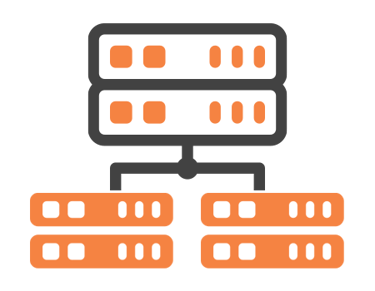VIRTUAL IT SOLUTIONS
IT Virtualization Topics
The concepts behind technologies like virtual desktop infrastructure, server virtualization, and VPNs can seem confusing at first. However, it's important to understand these technologies in order to recognize the variety of benefits and cost savings they provide to an organization. Below we share a deeper dive into each topic.
What is Virtual Desktop Infrastructure?
Are you looking for a cost-effective way to transform how your business makes use of PCs, laptops, and other devices? Virtual Desktop Infrastructure (VDI) is a type of virtual workstation setup that hosts a desktop operating system on a centralized server.
Virtual desktop infrastructure services can help you save money while simultaneously allowing you and your employees to accomplish more each business day. Take a moment to consider these questions:
- Have you ever invested in PCs and laptops only to see those same devices become outdated and obsolete far too quickly for your liking?
- Have you ever suffered a security or data breach because one of your laptops went missing or picked up a virus?
- When new software rolls out or it’s time for operating system updates, how successful are you at getting all your devices updated and compliant within a given deadline?
With desktop virtualization services, your employees can retain all of the mobility and experience of working on desktops, laptops, and other handheld devices while those devices operate via server-based computing power.

Virtual Workstation Solutions
For a better understanding of how desktop virtualization works, here’s a brief explanation of the two primary types of VDI:
- Persistent VDI—In this method, each user can access their own desktop image that can be customized and saved similar to a traditional desktop.
- Non-Persistent VDI—This option consists of a pool of uniform desktops that can be accessed by different users. Each virtual desktop reverts to its original state when a user logs out.
What are the Benefits of Virtual Desktop Infrastructure?
As many business owners have experienced, PCs and laptops quickly can become obsolete, get infected by malware, or go missing. With VDI, an end user’s computing and data are conducted and housed via a central database which eliminates all of the problems mentioned above. In addition, VDI offers organizations the following benefits:
What is Server Virtualization?
Dedicated teams in business are becoming more agile — and so are the machines that those businesses rely on to do their computing. In the past, each machine — or server — was dedicated to hosting one particular application, operating system, and related files. For a long time, this made sense because when hardware or software problems arose, they could be tracked down to a particular machine to rectify them.
Of course, offices, applications, and operating systems have become more complex over the years. The central processing units (CPUs) that drive the computing power of servers have also grown in complexity. As a result, the old practice of dedicating one server to one application is no longer necessary. It winds up crowding IT equipment rooms with servers that use only a fraction of their computing power while still consuming a lot of energy and producing a lot of excess heat.
The answer to this efficiency problem is server virtualization, or in other words, the creation of virtual server infrastructure.
Sounding more complex than it is, server virtualization is the practice of dividing a single physical server into multiple, isolated virtual servers. Despite existing on the same physical server, each virtual server is unique and capable of running its own operating systems independently.
It’s far more efficient and budget-friendly to create a virtual server infrastructure than to dedicate a separate server to each major application. Server virtualization also reduces energy consumption and makes server setup much more manageable.

Virtual Server Solutions:
Hyper-V and WMware
Are you looking for a proven way to increase the agility and scalability of your IT without breaking the bank? Imagine an IT infrastructure that’s easier to manage and operate while being less costly than your current model.
Virtualization is a process that facilitates the creation of software-based representations of applications, servers, storage solutions, and networks. It’s single-handedly the most cost-effective way to reduce your IT expenses while your business grows — no matter what size company you’re running.
Preferred virtualization solutions Hyper-V and VMware and Hyper-V are available both on-premise or in the cloud:
What is Hyper-V?
This virtualization solution gives you the power to partition a single server into multiple virtual machines. Without the need for installation or configuration, you can utilize each virtual environment to host hundreds of hardware and software components.
What is VMware?
Designed for large organizations with a data center or cloud-based storage, VMware allows you to:
- Virtualize workloads
- Build a personal, private cloud
- Scale services in a public cloud
- Create a combination of all three options
What are the 3 Types of
Server Virtualization?
When it comes to server virtualization, there are three options to consider: Full Virtualization, Para-Virtualization, and OS-Level Virtualization.
What are the Benefits of Server Virtualization?
- Higher server availability
- Easy scalability
- Lower operating costs
- Reduced physical server complexity
- Expanded application performance
- Faster deployment of workloads
What is a VPN?
The VPN or Virtual Private Network was designed by Microsoft in 1996 to support secure access for remote employees into internal networks. This direct, private connection protects sensitive business data and communications which otherwise be vulnerable if transferred over public networks. When you access a site utilizing a VPN server, your connection source is displayed as one of the many VPN routers as known as a proxy server instead of showing your actual source information. Therefore, no one can spy on you or uncover who you are.
If the concept of a VPN is still unclear, think of it this way: Imagine you’re a popular superhero flying around in an invisible jet. With the right devices, villains on the ground can watch everything you’re doing and even trace
your movements. This is akin to using the public internet. Now imagine that the entire jet has a protective outer layer that matches the color of the sky. Nefarious people can no longer track you or see what you’re doing. Using a VPN protects your activity, your data, and your identity online.

Does My Business need a VPN?
The answer to this question depends on the type of activities and volume of business you conduct via the internet. However, more often than not, the answer is “yes.”
The public internet creates privacy and security issues to which you do not want to expose your company or your data. Hacking and industrial espionage, for example, are considerable problems in today’s business environment. Malicious invaders stealing the data of your company or your customers can have disastrous consequences for both customers and your business.
A VPN can provide you with a variety of safety features that can help protect your network, including encrypting data transfers and traffic, securely accessing data on a corporate network remotely, and other crucial processes that can keep your business’s information secure. Another benefit that is not relevant to every business is that a VPN can also help you access international websites that might otherwise be restricted from computers in your location. The VPN can mask your IP address to align with that of a location within a different country to get around locational restrictions.
What Information does a VPN Hide?
VPNs reroute all your “traffic” or online activity through other servers, so your data as well as your physical location stays hidden. When it comes to online privacy solutions, VPN offers the best balance between transmission speed and comprehensive security. No matter if you use a VPN via a wired connection or through WiFi, it will keep your user's activity, location, data, and identity private.
PCS is Your Solution for IT Virtualization Services
Although your business may be facing IT issues we’ve solved before, we never lose sight of the fact that your business is unique and deserves to be treated as such. Our team works hard to get to know you, listens to your specific needs, and develops customized IT strategies that make sense for your business.
We never try to sell you cookie-cutter solutions or lock you into cumbersome contracts because that’s just not how we operate. At PCS, we like to say that we’re an outstanding customer service company that just also happens to be a world-class IT support company.
When it’s time to get more out of your IT infrastructure, choose the helpful PCS team for your server virtualization services. Our skilled technical support is fully matched by our superb customer service.
Contact PCS for a free 30-minute IT consultation today to discuss your IT needs. We look forward to serving you.



